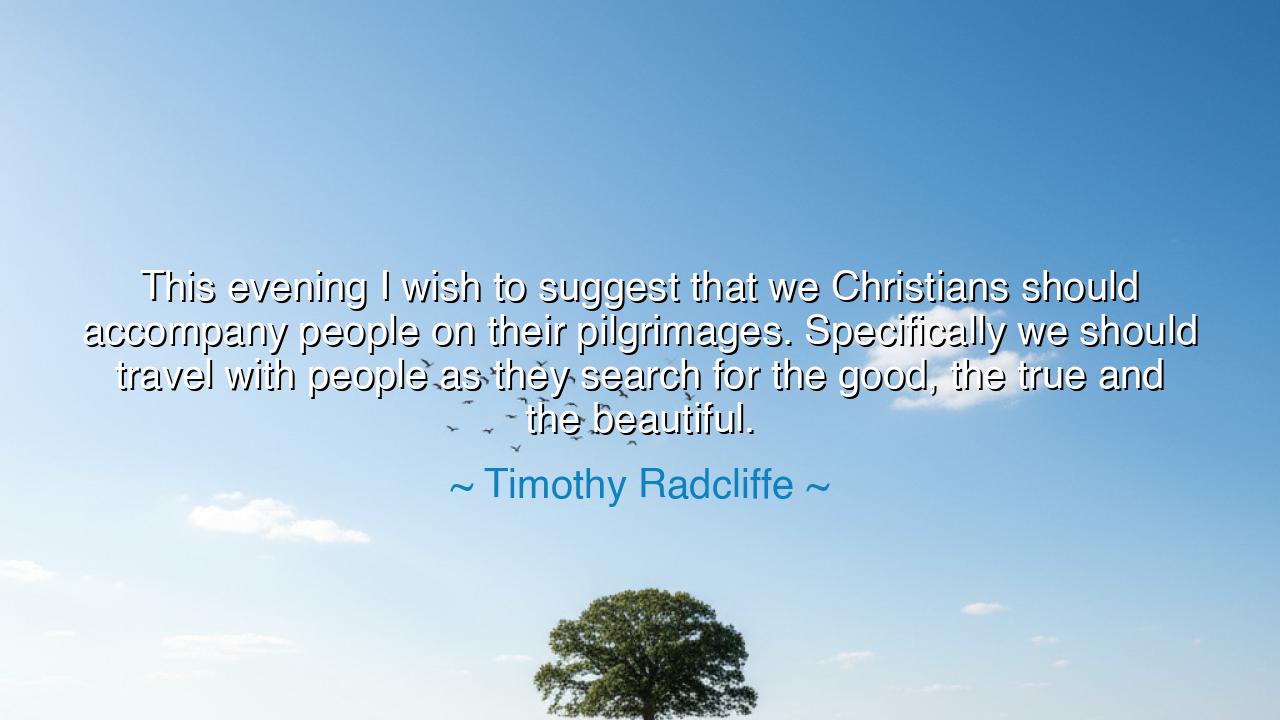
This evening I wish to suggest that we Christians should
This evening I wish to suggest that we Christians should accompany people on their pilgrimages. Specifically we should travel with people as they search for the good, the true and the beautiful.






In the words of Timothy Radcliffe, a teacher and preacher of the faith, we are given a vision of companionship and sacred journey: “This evening I wish to suggest that we Christians should accompany people on their pilgrimages. Specifically we should travel with people as they search for the good, the true and the beautiful.” Though spoken gently, these words shine like fire on the horizon, calling us to remember that life is not meant to be walked alone, and that the holiest service we can offer is to walk beside others as they seek meaning.
To accompany is more than to walk in step; it is to bind oneself in compassion to the journey of another. It is to say: “I will not leave you when the road is hard, I will not abandon you when the path grows dark.” In ancient times, pilgrims traveled dangerous roads to shrines and holy places, and often it was not the destination but the companionship that gave them strength. Radcliffe reminds us that our duty is not to stand above others as guides, but to kneel beside them as fellow travelers, sharing their burdens and their hopes.
The word pilgrimage is rich with meaning. It is not only the physical trek to a sacred place but the deeper journey of the soul toward truth. Every man and woman is a pilgrim, whether they cross deserts to Mecca, walk to Santiago de Compostela, or wrestle in the silence of their own hearts. To walk with others on this road is to honor their humanity, to dignify their questions, and to assure them that in seeking the divine they are not abandoned.
Radcliffe names the eternal objects of this search: the good, the true, and the beautiful. These are the pillars of human longing, sung by philosophers and prophets alike. Plato spoke of them as eternal forms, radiant and unchanging; Augustine saw them as reflections of God Himself. To walk with another in pursuit of these is no small task—it is to accompany them in the noblest quest of existence, the search for that which makes life worth living.
History offers us luminous examples. Consider St. Francis of Assisi, who walked beside both nobleman and beggar, bird and beast, not as one above them but as a brother among them. His life was a pilgrimage of love, showing others that the good, the true, and the beautiful were not distant ideals but realities made visible in kindness, humility, and creation. His companionship transformed the lives of many, because he traveled their road with them, singing as he went.
And yet, Radcliffe’s words also carry a warning: do not mistake companionship for control. To travel with people in their seeking is not to force them to walk your path, but to honor the path they are on, even if it differs from your own. Too often in history, zeal turned to tyranny, and instead of walking beside, some sought to drag others by force. His reminder is clear: true accompaniment respects freedom, listens with humility, and trusts that God’s truth shines in many ways.
The lesson is clear: do not walk alone, and do not let others walk alone. Be the companion who listens, who encourages, who points gently toward light when the shadows seem overwhelming. Seek not to dominate another’s pilgrimage but to bless it, to make the road less heavy by your presence. And in your own seeking, welcome those who walk with you, for even the strongest traveler falters without fellowship.
So I say to you, children of wisdom: when you meet another on the road, do not pass them by. Accompany them. Travel with them. Seek together the good, the true, and the beautiful. For the journey is long, and the destination uncertain, but those who walk side by side shall find, at last, that even the road itself has become holy.






AAdministratorAdministrator
Welcome, honored guests. Please leave a comment, we will respond soon